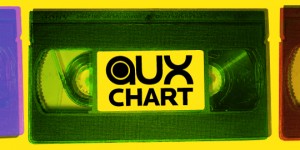Ironic pop can still make for great music
by Ryan McNutt
September 15, 2014
“Do you like sports? Also, did you used to be a baby?”
That’s my favourite bonkers lyric from Buck 65’s new song, “Super Pretty Naughty,” but I just as well could have chosen one of several other bewildering one-liners. Anyone who’s followed Rich Terfry’s impressive career as Buck 65 knows well to expect some curveballs, but few have been as left-field as the leadoff single from the forthcoming Neverlove.
“Super Pretty Naughty” is a perfectly constructed EDM-influenced pop hit, little different than what you’d hear from the likes of Kesha, Rihanna or Flo Rida. That would be strange enough coming from Terfry, but he then pairs that foundation with lyrics that are borderline nonsensical — as if someone was attempting to make a reasonable facsimile of a pop song, full of clichéd party lyrics, and something got lost in translation.
Turns out that’s not far off from the truth. Writing to Entertainment Weekly to unveil the song’s equally crazy video, Terfry explains that he ran many of the song’s lines through online language translators until they came out particularly absurd. But his starting point for those lyrics began the same way countless male pop songs have been written throughout history: to impress a girl.
“After my wife left, I met a girl who I was hoping would give me hugs and kisses… I figured I might get lucky if I made a song she liked, so I asked her about her taste in music. She listed off all the things she likes about the music she dances to in clubs and I wrote it all down. I still have the piece of paper. She mentioned lyrics with ‘la la la’ parts, four-on-the-floor beats, classic house music, mentions of birthdays and getting dressed up, ‘build ups,’ as she put it, shiny synth sounds, breakdowns, ‘rainbows’ (I wasn’t sure what she meant by that), and lots of hooks. It all went into the blender.”
To provide the song’s music, Terfry teamed with Swedish songwriter and producer Marten Tromm, who’s worked with everyone from Carly Rae Jepsen to Hawksley Workman. The resulting track feels like an alien’s take on the pop form: it gets nearly all the mechanics and mathematics right, but in its inability to grasp the particular nuance of human communication, it dives head-first into the uncanny valley of weirdness.
It’d be all too easy to read the song as Terfry’s ironic take on the clichés that run rampant in the pop form, particularly in its lack of lyrical inspiration and overreliance on formulaic “party” imagery. But here’s the rub: “Super Pretty Naughty” is actually a rather effective pop song. On his website, Terfry explains that one of the reasons he’s releasing the song at all, rather than leaving it locked away as an endearing novelty for his own amusement, is the reaction it’s gotten every time he’s shared it with others: his label, in his live show, and as a DJ.
“The place went berserk,” he said, of one particularly experience playing the song at a software party. “In my experience as a DJ, that’s very rare — for people to freak out for a song they haven’t heard before. People usually like a bit of familiarity on the dance floor. It was another pleasant surprise.”
“Super Pretty Naughty” succeeds as pop parody — but it also succeeds as pop. Does that render its seeming critique of pop null and void?
In a case of fortuitous timing, “Super Pretty Naughty” isn’t the only song of the moment that begs this question — heck, it’s not even the only Canadian song.
Vancouver’s Marianas Trench aren’t really a known commodity outside of the Great White North, and they’re a mostly ignorable one unless you listen to Canadian pop radio or watch MuchMusic on the regular. When the band released their new song, “Pop 101,” last month, it took three or four days until I even caught wind of it, as my Twitter feed of music writer/illuminati types seemingly didn’t give two shits. That’s no surprise: there’s nothing at all cool about Trench, who sit alongside Hedley and Down With Webster as the definitive “CanCon” bands of the past decade or so, seemingly created solely to meet airplay quotas while reaching Canadian youth with easily digestible pop-punk jams.
“Pop 101” cuts through that clutter, somewhat, in its deconstruction of the pop form. While Buck 65 uses absurdity to comment on pop music, Marianas Trench take a more on-the-nose clinical approach. “Pop 101” has vocalist and songwriter Josh Ramsay describe each and every trick the song is using to grab the listener’s attention, both musical and lyrical, from counting its chord progression (“1-4-6-4”) to adding in dubstep drops, Timbaland-style shout-outs and, in one portion, a folk-melody overlay that mocks the prevalence of Mumford and Sons-style roots influence in modern pop.
Most of these jabs aren’t particularly clever. It’s pretty obvious that rappers don’t exactly save their best material for a pop song guest verse, for example. The parts of the song that reference music theory do make me laugh a bit, like when Ramsay notes his preference for “harmonies in thirds, not fourths” and labels “four-on-the-floor” as “a beat you can’t ignore,” but that’s mostly because I’m a wonky music nerd.
However, while the song on its own is hardly high satire, in the context of Marianas Trench’s career and that of songwriter Ramsay, it’s oddly compelling.
Let’s backtrack for a second… though the band started in 2000, Trench didn’t gain a lot of traction until their full-length debut, Fix Me in 2006. The lyrics of the band’s breakthrough single, “Shake Tramp” (“they slap you like a bitch and you take it like a whore,” ick) were uncomfortable to say the least, but from the Beach Boys-style intro to the singalong chorus, it was clear the band had pop chops. On 2009’s Masterpiece Theatre they came into their own with three CanCon hit singles — “Cross My Heart,” “All To Myself” and “Celebrity Status” — all of which I’ll happily rep for as perfectly enjoyable pop punk, sort of like Fall Out Boy but without Pete Wentz’s lyrical distinctiveness (for better and/or for worse).
Then something notable happened in between Masterpiece Theatre and its 2011 follow-up, Ever After. See, even if you’ve never heard a Marianas Trench song, you’ve likely heard a Josh Ramsay one: he’s the co-writer and co-producer of Carly Rae Jepsen’s “Call Me Maybe.”
Though “Maybe” didn’t become an American hit until 2012, it was released to Canadian radio in September 2011. Mere weeks beforehand, Ramsay’s day-job band released its new single, “Haven’t Had Enough” — a song that not only bumped up the keyboards in lieu of loud guitars, but has a chorus that is constructed exactly the same as “Call Me Maybe.” While few songs on Ever After were as explicitly connected to Ramsay’s forays into writing for other artists, they all gained a huge radio-friendly pop sheen, particularly ballads like “Fallout.” And when Jepsen’s (unfairly ignored) full-length album Kiss came out a year later, there was another Ramsay-Jepsen collaboration, “Guitar String / Wedding Ring” — lo-and-behold, with a chorus that also repeated “Call Me Maybe’s” deliriously effective tricks.
And that’s what makes “Pop 101” interesting to me: if it’s meant as a cynical critique of the pop form, it’s coming from someone who’s immersed himself in that cynicism and benefitted immensely from it. Ramsay hasn’t spoken much yet about “Pop 101,” so I’m left speculating about his intentions: does it come from a place of genuine discontent with pop formula? Self-mockery in good humour? Simply an honest expression of pop reality in 2014?
What if it’s all of the above?
I’ve used the words “irony” and “cynicism” a couple of times so far in this piece, and every time I review my notes, they seem weirdly out-of-place.
And that’s not because there’s no irony in “Super Pretty Naughty” and “Pop 101;” heck, there’s probably some playful cynicism in their design as well. But the way in which we typically apply those terms still feels like a relic from cultural conversations two decades ago.
Here’s what American journalist Thomas Frank wrote in a 1998 piece for Harper’s Magazine, titled “Pop Music in the Shadow of Irony”:
“In fact, so widespread has the ironic impulse become that the only thing about irony that really startles anymore is its longevity as an American style, the fact that, a full thirty years after Andy Warhol’s heyday, so many still look out at the great heaps of failed culture-industry products that surround us and conclude that they have no choice but to marvel at the process of cultural mass production itself, to snicker at the various fads and stars and tastes foisted upon us or on our parents.”
Reacting to culture ironically is, ultimately, a coping mechanism: a tool by which we navigate the abundance of art in the age of mechanical reproduction (to steal a phrase from Walter Benjamin). To Frank’s point: if we no longer feel like we have the ability to reasonably challenge or critique production (or reproduction) itself, we turn our attention to mocking its artifacts instead. If there’s always going to be Britney Spears songs in the world, perhaps the best we can hope for is to make fun of them.
One might expect that as the abundance of culture has only increased in the digital age, irony has continued to run rampant, an argument Princeton Professor Christy Wampole made in her critique of hipster culture two years ago for the New York Times:
“It stems in part from the belief that this generation has little to offer in terms of culture, that everything has already been done, or that serious commitment to any belief will eventually be subsumed by an opposing belief, rendered the first laughable at best and contemptible at worst. This kind of defensive living works as a pre-emptive surrender and takes the form of reaction rather than action.”
But this doesn’t feel completely right, does it? So many of my friends I’ve chatted with about “Super Pretty Naughty” — I don’t really have friends who welcome my attempts to talk about Marianas Trench — simultaneously entertain two different reactions to the song: they both laugh at its absurdity and satire, but genuinely enjoy it as pop music.
I’d suggest labeling “Super Pretty Naughty” and “Pop 101” straightforward “irony” does a disservice to how we increasingly play with culture in the digital age (if it was ever appropriate at all). Whether you call this shift in approach “post-irony” or the more popular “New Sincerity” (a term that dates back to the 1980s), it’s best summed up by Jesse Thorn, host of PRI Bullseye: “think of it as irony and sincerity combined like Voltron, to form a new movement of astonishing power.” His example, in his short-but-strangely-engaging pitch on the concept, uses Evel Knievel as the example: there’s no way to literally appreciate Knievel, because he’s so over the top, but he’s also actually “awesome” in his excess.
Poptimism is the term most commonly used to describe the critical embrace of the pop music form over the past decade or so (though I prefer popism, since it feels less value-laden and combative), and it feels part-and-parcel with this New Sincerity: its foundation is the idea that critique and enjoyment need not be mutually exclusive. We can appreciate pop music for its effectiveness, while still discussing and working to understand how it’s built, the songwriters and economic structures behind it. Or, hell, sometimes we can just shut up and go along for the ride; that can have value, too.
So back to the question at hand: is it a problem that “Pop 101” and “Super Pretty Naughty” seem to want to have it both ways, both critiquing and celebrating the pop form? To most of us in the here and now, absolutely not. What’s great about our culture’s change in attitude towards pop in recent years is that many of us no longer react to all pop with scorn and indignation. The risk, though, is that at some point we end up flirting with the dead-end of relativism Wampole’s hipster nightmare: “a surrender to commercial and political entities more than happy to act as parents for a self-infantilizing citizenry.”
Tags: Music, Cancon, Featured, Buck 65, Marianas Trench





